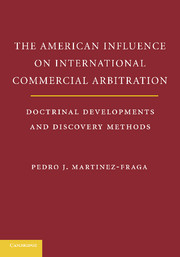 The American Influences on International Commercial Arbitration
The American Influences on International Commercial Arbitration Book contents
- Frontmatter
- Contents
- Table of Citations
- Acknowledgments
- Foreword
- Preface
- 1 Introduction
- 2 The Formation and Transformation of the Status of International and Domestic Arbitration in the United States
- 3 Wilko v. Swan, Scherk v. Alberto-Culver, and Mitsubishi v. Soler: Crafting a Level Playing Field
- 4 Procedural Change and 28 U.S.C. §1782: The Taking of Evidence v. Common Law Discovery
- 5 The Gathering of Evidence v. Common Law Discovery
- 6 What Has Really Happened? The Effects of a Trilogy Examined
- 7 The New Unorthodox Conception of Common Law Discovery in International Arbitration
- 8 And Now How Do We Avoid 28 U.S.C. Section 1782 in International Commercial Arbitration?
- 9 Perjury & Arbitration: The Honor System Where the Arbitrators Have the Honor and the Parties Have the System
- 10 Developments in the Apportionment of Jurisdiction Between Arbitrators and Courts Concerning the Validity of a Contract Containing an Arbitration Clause, and Transformations Regarding the Severability Doctrine
- 11 U.S. Arbitration Law and Its Dialogue with the New York Convention: The Development of Four Issues
- Conclusion
- Appendix A Duelo a Garrotazos
- Appendix B Selected Cases
- Appendix C The New York Convention, The Federal Arbitration Act, and 28 U.S.C. §1782
- Appendix D Amendments to 28 U.S.C. §1782
- Appendix E Selected Rules of Civil Procedure
- Appendix F Geneva Convention of 1927
- Appendix G Selections from the Legislative History of the Federal Arbitration Act
- Index
- References
7 - The New Unorthodox Conception of Common Law Discovery in International Arbitration
Published online by Cambridge University Press: 11 July 2009
- Frontmatter
- Contents
- Table of Citations
- Acknowledgments
- Foreword
- Preface
- 1 Introduction
- 2 The Formation and Transformation of the Status of International and Domestic Arbitration in the United States
- 3 Wilko v. Swan, Scherk v. Alberto-Culver, and Mitsubishi v. Soler: Crafting a Level Playing Field
- 4 Procedural Change and 28 U.S.C. §1782: The Taking of Evidence v. Common Law Discovery
- 5 The Gathering of Evidence v. Common Law Discovery
- 6 What Has Really Happened? The Effects of a Trilogy Examined
- 7 The New Unorthodox Conception of Common Law Discovery in International Arbitration
- 8 And Now How Do We Avoid 28 U.S.C. Section 1782 in International Commercial Arbitration?
- 9 Perjury & Arbitration: The Honor System Where the Arbitrators Have the Honor and the Parties Have the System
- 10 Developments in the Apportionment of Jurisdiction Between Arbitrators and Courts Concerning the Validity of a Contract Containing an Arbitration Clause, and Transformations Regarding the Severability Doctrine
- 11 U.S. Arbitration Law and Its Dialogue with the New York Convention: The Development of Four Issues
- Conclusion
- Appendix A Duelo a Garrotazos
- Appendix B Selected Cases
- Appendix C The New York Convention, The Federal Arbitration Act, and 28 U.S.C. §1782
- Appendix D Amendments to 28 U.S.C. §1782
- Appendix E Selected Rules of Civil Procedure
- Appendix F Geneva Convention of 1927
- Appendix G Selections from the Legislative History of the Federal Arbitration Act
- Index
- References
Summary
The phenomenology commands adjustment to bridge the gap between essence and phenomenon, what is and what is seen. Careful analysis establishes that discovery and the underlying tenets configuring the system commonly referred to as the Federal Rules of Civil Procedure, while conceptually and doctrinally distant from the civil code and the continental system, are close to arbitration and the underlying policies that sustain and define it as distinct from judicial proceedings because of its foundation rooted in party-autonomy. The “classical conception” of the civil code or continental system, however, is materially and significantly distant conceptually and doctrinally from arbitration generally and the precept of party-autonomy that is so endemic to the configuration of arbitration and arbitral proceedings. Accordingly, discovery as framed, formed, and defined by the Federal Rules of Civil Procedure clearly comports with the nature of arbitration, and it is only because of the misperception arising from want of familiarity on the part of practitioners from other non-common law jurisdictions, and adherence to platitudes of discovery abuses by common law practitioners, judges, and commentators, that the affinity between discovery and arbitration has been obscured.
Before having engaged in a schematic and rather skeletal analysis of Fed.R.Civ.P. 3 and 27, with reference to the discovery standard enunciated in Fed.R.Civ.P. 26 so as to dispel notions of “unbridled scope” and a boundless license to engage in a fishing expedition, the following proposition was posed: If it is assumed that a defining precept of arbitration is the principle of party-autonomy, and more generally so, the principles of predictive value, transparency of standard, and certainty, then it is less than clear that the incorporation of U.S. common law style discovery into arbitration proceedings consonant with the Section 1782 rubric and Fed.R.Civ.P. 26, undermines the policy objectives that arbitration fervently seeks to promote.
- Type
- Chapter
- Information
- The American Influences on International Commercial ArbitrationDoctrinal Developments and Discovery Methods, pp. 67 - 85Publisher: Cambridge University PressPrint publication year: 2009


